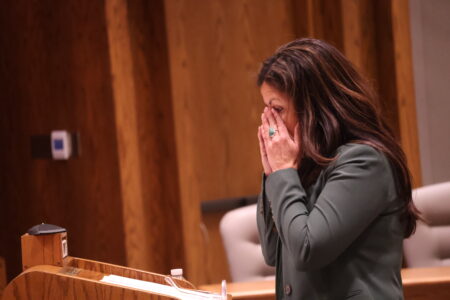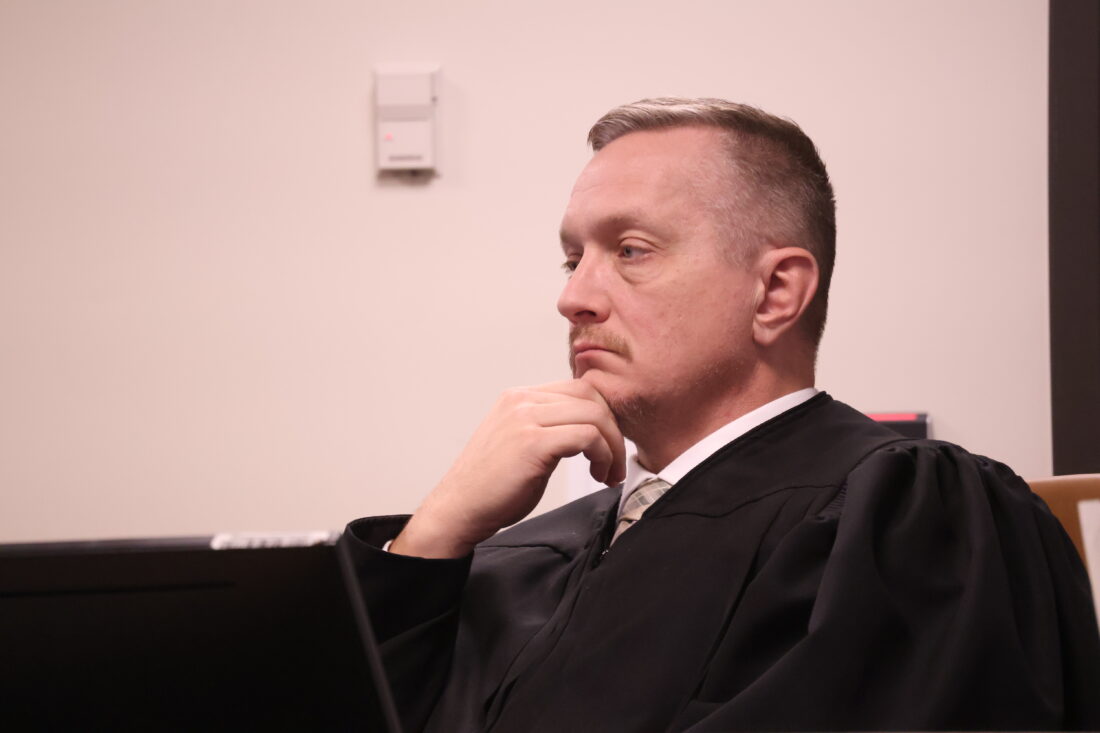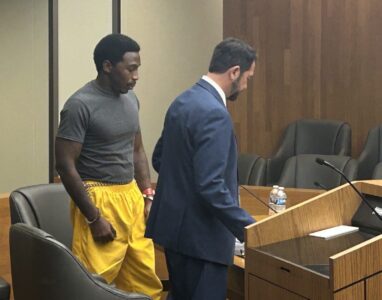Kansas Supreme Court finds no rules violation by former DA, will impose no discipline; Valdez calls it a ‘righteous decision’

photo by: Chris Conde/Journal-World
Former Douglas County DA Suzanne Valdez addresses the Kansas Supreme Court at her disciplinary hearing Tuesday, April 1, 2025.
Updated at 12:02 p.m. Friday, Aug. 29
A majority of the Kansas Supreme Court has found that former Douglas County District Attorney Suzanne Valdez did not violate a state rule of professional conduct and will not be disciplined.
“A righteous decision was issued today by the Kansas Supreme Court,” Valdez told the Journal-World via text after the court issued its 43-page opinion Friday in her favor.
The court found that Valdez’s statements to the press and on social media that were critical of the Douglas County District Court’s decision to hold jury trials at the local fairgrounds during the COVID-19 pandemic, and of Chief Judge James McCabria specifically, did not constitute conduct degrading to a tribunal under the state’s rules of professional conduct.
McCabria on Friday told the Journal-World that he respected the court’s decision.
“Throughout this process, the judges of Douglas County District Court have deferred to the Office of Attorney Discipline and the procedures enacted by the Supreme Court as the venue where these issues would be determined,” he said in an email. “We continue to hold to that position. The Supreme Court heard the case that was presented to them and we respect their time and consideration of these matters.”

photo by: Chris Conde/Journal-World
Douglas County Chief Judge James McCabria appears at a hearing on Dec. 17, 2024, in Douglas County District Court.
The majority of the Supreme Court narrowly interpreted Kansas Rule 3.5(d), which forbids conduct degrading to a tribunal, to apply only in an “adjudicative capacity” — that is, in the context of an actual legal or other adjudicative proceeding. Valdez’s statements were made outside this context, the majority ruled.
“It is clear … that this rule is intended to preserve courtroom decorum for the fair and impartial administration of justice — not to restrain lawyers from ever criticizing the court in a manner that could be considered rude or offensive,” the majority wrote, drawing a distinction between the adjudicative and administrative roles of a court.
Concurring separately in the judgment, Justice Caleb Stegall said he would go even further and find that the Kansas Rules of Professional Conduct do not apply to a lawyer’s political speech given the viewpoint protections provided by the First Amendment.
“… I fear the continuing chill on attorney speech in Kansas by the well-meaning but aggressive action of the ODA (Office of Disciplinary Administrator) to take up the cause of bruised judicial feelings and punish all manner of ‘discourtesies,'” Stegall wrote. “To which I can only say, ‘Stop it!’ Kansas judges are not so delicate.”

photo by: Chris Conde/Journal-World
Five justices of the Kansas Supreme Court hear oral arguments in the disciplinary case of former Douglas County DA Suzanne Valdez on Tuesday, April 1, 2025, in Topeka.
In dissent, Justice Eric Rosen and Senior Judge Nancy Parrish said they would broadly interpret Rule 3.5(d) to protect courts as fundamentally adjudicative bodies in all official capacities, not only during active legal proceedings or filings.
The dissenters said they would have imposed public censure on Valdez, arguing that her conduct “undoubtedly cast doubt on the court’s integrity and constituted discourteous conduct degrading to the tribunal.” The proper forum for airing her issues with McCabria would have been via a formal complaint to the Commission on Judicial Conduct, they wrote.
As the Journal-World reported, Valdez’s disciplinary matter stemmed from McCabria publicly stating during the pandemic that he had consulted with all stakeholders to ensure safety at trials. Valdez, however, disputed that she had been consulted, which led to her issuing a news release and social media posts in which she implied that McCabria was untruthful, “insecure” and sexist.
A disciplinary panel last year, after hearing from a majority of Douglas County judges who testified against Valdez, found that Valdez violated “her duty to the legal system, the legal profession, and the public as a result of her comments about Judge McCabria” in the press release and in the Facebook post. It found that she did so knowingly and that her misconduct “caused actual injury to the legal system, the legal profession and the public.”
The panel also found that she had “impugned Judge McCabria’s character in a publicly issued press release and by referring to him as an ‘insecure man.'”
In oral arguments before the Supreme Court in April, Valdez acknowledged that she had made “a grave mistake” and offered an apology. Her attorney, Stephen Angermayer, argued to the five justices hearing the case that Valdez deserved at most an informal admonition.
Special prosecutor Kimberly Bonifas, on the other hand, told the court that public censure should be the minimum punishment, although she had originally requested that Valdez lose her law license for a year.
In the end, the court found no cause for discipline and dismissed the case.
Five justices, instead of all seven, heard the case because one justice, Evelyn Wilson, was absent due to a medical diagnosis. Another justice, K.J. Wall, had recused himself.
Valdez, a Democrat, defeated former DA Charles Branson in 2020 and served one term before losing to Democratic primary challenger Dakota Loomis last year. She blamed her loss on media coverage of her disciplinary case.





